Uncategorized
TCI Governor Nigel Dakin Remarks at Nat’l Press Conference
Published
4 years agoon
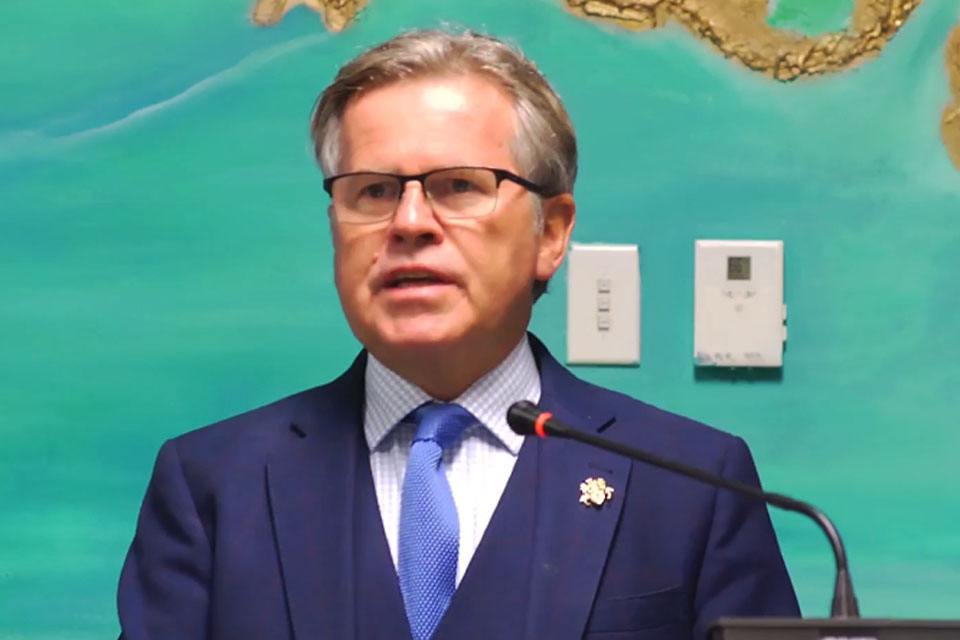
#TurksandCaicosIslands – FULL STATEMENT FROM SEPTEMBER 15, 2020 – Good afternoon Turks and Caicos. For those listening on the radio I’m speaking to you from the Premier’s Office and I am joined by the Premier and the Police Commissioner.
Our intention is, in our different ways, to update you on national security and it is my intention to talk to four capabilities: policing, counter-illegal immigration, the prison and the Regiment.
But at times of pandemic and its economic consequences it is impossible, as Governor, to talk to these capabilities without framing them in the wider national context of three overlapping challenges, challenges that if we are not careful can seem individually daunting and collectively over-whelming: they are the economy, health and crime. They can’t be separated in 2020; this year they are different parts of the same national story.
Globally the year 2020, and very probably 2021, are not going to be remembered fondly. We are all in a situation we have never been before and frankly never wish to be again. These aren’t the acute dark times after a hurricane, when we know recovery will come at pace, or the chronic times during a global recession but when tourists still come. It’s the ‘not knowing’ what the future will bring, because we have not been here before, that for many is so disheartening.
Some of you, I know, because you have told me, have found something positive to take from this period – I rejoice in your approach – but the vast majority have not. The changes we have all been through over the last six months: be it loss of liberty or employment; loss of community or loss of income have for many been profound.
Crucially however, for reasons I will elaborate on, what we have not seen – is the loss of the most important thing of all – the mass loss of life. We haven’t seen what has happened in Europe or the US. You did this, early on, by accepting a very tough lockdown while the Territory had chance to ready itself for what was always going to be an eventual curve. We have just been experiencing that.
So the worst thing we can now lose collectively is ‘hope’. And so I want my overriding message today to be this. We are collectively in a far better position than you may believe. The pandemic has been accompanied by an ‘infodemic’. With many people staying at home we have all been able to engage relentlessly with social media to the point that speculation and unnecessary fear have become a currency that now needs careful correction.
What I do not want to give you is false hope, that would be unfair to the point of cruel but instead I do want to give you a realistic – steady – considered appraisal of where I believe we are and explain why. In this intensely complicated environment, when countries of 10’s of millions or 100’s of millions – and with endless wealth – are seemingly struggling – we are in fact doing okay; in fact we are doing more than okay – we will come out of this.
In terms of the position the Cabinet has taken we have, as a team – the elected and non-elected alike – sought to balance six priorities: we want to keep the country healthy, by which we mean a very low rate of hospital admissions from COVID, we want to keep our international borders open, we want to keep as far as we can the economy moving, we want to be open to tourism and we want you – the people – to be safe throughout. Beyond that we want to keep all the other functions of government running as far as we can, as normally as we can.
Keeping our balance on this tightrope of conflicting priorities is not straightforward, it would be easy to over-compensate on one and cause intense difficulty on the others. Keeping our balance is though necessary – and none of it can be done without your understanding and crucially your support – in helping us suppress the numbers to the point where we are not overwhelmed by serious illness or death brought on by COVID.
Health:
So let us start with Health. We started this global crisis poorly prepared to face a pandemic. We are not a healthy population and our hospitals are normally working at full capacity at the best of normal times. Much of our tertiary care has to occur overseas and that requires easy travel. We held no significant stocks of personal protection equipment on the Islands. We had no national laboratory. As a small Territory we don’t carry a deep bench of health professionals. As a small state we are built to deal with the normal times not the extraordinary.
Yet – six months in – what is important to say, very clearly, is we do not have a health crisis. The actions you all took, under the initial emergency powers, allowed us to postpone the significant uptick we hda, until we were prepared. The most significant advance was to generate our own testing capability – you have heard me say before what a remarkable achievement that was. We moved from zero tests, to 22 tests a day, to 88, with recent automation of some processes that gets us to 100. There are funds available to secure full automation that could take that number up to many hundreds a day.
We are, today, involved in a fierce global fight to secure not necessarily the equipment – we can get that – but the consumables that can support it. Members of the Ministry of Health and my Office are working daily to secure this automated upgrade. The ability to then – almost overnight – test many hundreds a day catapults us – because we have a small population – into a top-flight global testing power. All this from a standing start.
While testing has developed so too have our stocks of Personal Protection Equipment. The UK have donated over $1.3 million of PPE. That included, as but some examples, over 16,000 coveralls, 157,000 gloves, 20,000 gowns, 66,000 masks, 22,000 N95 masks, 22,000 visors, 12,000 tests kits. 20,000 swabs and 2 PCR machines. We have received more items of PPE from the UK than any other Overseas Territory.
Our hospital capacity has been, and is, increasing. It has yet to be stretched by COVID19 and much of that has to do with the restrictions you have followed. Thank you. Beyond that the Cuban doctors are here and will be extended. Further specialist beds, as a contingency, arrive from Cayman tomorrow.
And we are not doing this alone. On Sunday a medical team of four arrive from the UK to reinforce our hard pressed Health Team who have been working flat out for six months. That includes direct UK support to the Premier, the Permanent Secretary, Chief Medical Officer, Laboratory Manager and Epidemiologist. The UK is paying for this health deployment, as it paid in full for the previous military deployment, which will last into the next year. It should give our local team – who have been heroic, in that I don’t think they have had a day off in six months – the head-space to grow our local health capability in the way TCI needs.
The numbers looked scary two weeks ago. We kept seeing significant double-digit daily increases. This was significant enough for Cabinet to consider a complete lock-down of the country and closure of the borders. We have not done that – it would have been to Cabinet’s mind an over-reaction. We opted instead for the restrictions you have been following, and the results of those measures are now starting to bite. There is always a lag – but daily numbers of new active cases are now coming down. Holding our nerve seem to have paid off.
The following numbers are therefore important. In the two-week period from 18 to 31 August there were 237 new cases reported. Set against this, in the last two weeks (1 to 14 September) 112 cases were reported (down 125, or almost halved). Then in looking in more detail over the last 14 days the numbers have moved as follows, starting on 1st September: 17, 22, 14, 7, 1, 0, 15, 14, 10, 3, 3, 2, 2 and, yesterday, again 2. Within these some are asymptomatic and some of these asymptomatic cases will not be contagious, but instead registering dead virus still in their system. The point is the significant restrictions you are being asked to adhere to are working. Today feels very different from late August.
The new legislation that allows immediate ticketing should help strengthen this trend and be far more in play in the coming weeks. There is a joint enforcement unit between public health and the Police; the Commissioner will brief on hotline numbers and email addresses where you the public can help support enforcement at this crucial time.
The Economy:
This is the Premier’s area and so I intend to say little other than this. TCI entered this pandemic in an extraordinarily vulnerable position, given our tourism mono-crop, but about as well prepared financially as it could have been. We had strong reserves, next-to-no borrowing and BBB+ rating. The Finance Ministry – who are first class and one of the jewels of the TCI – have a reputation in the UK for excellence and probity. The Premier’s reputation in the UK for prudence is now a significant advantage in these testing times.
The Premier told the Territory in her last press statement that there will be a need to borrow, and there will. The figures will emerge but it’s obvious to me it will be to the tune of many $100 millions. No country will get through this period without doing so and, for example, UK borrowing is – on every measure – the highest it has ever been since recent records began and close to two Trillion Pounds Sterling- larger than the whole of the UK economy. How TCI’s debt is used, and paid for, are of course the key questions.
The Premier, Permanent Secretary Finance and myself have kept the UK informed over the last six months so there will be no surprises in London. As and when the Territory needs support the UK will backstop loans that are appropriate and properly financed. It’s at moments like this that the relationship with the UK moves into the strategic. This Island is not going to go bankrupt.
If we can wean ourselves off a total reliance on this single industry the fundamentals that make this Territory attractive, remain. Proximity to the US market, the US Dollar, a legal system that in the end terminates in the Privy Council in London, a reputation built since the Interim administration for good governance, English speaking, and with an environment of sun, sea and sand that are beyond enviable. We could not and cannot change the weather on tourists willingness to travel but our second largest industry – construction – is delivering and helping keep money moving through the economy. The wake-up call that we didn’t need – but surely now can’t ignore – is that we cannot go forward as a one-trick economy.
Crime:
I said when I last spoke, that serious crime remains a stubborn fact. I don’t intend to repeat what I said then. Increasingly the victims of violent crime are young men, running with the wrong group, settling scores that in my youth would have been settled with fists not weapons. Having been here a year I am probably the person least qualified in the room, or in your workplace or your home, to describe why we have got to where we are.
The point is we are here – and what I can promise you is that there is now no quick fix to a long cooked problem. The most draconian of measures would only suppress, for a limited period, not resolve the underlying issues. If we wanted a society where keys could be left in cars, and where home security wasn’t a consideration, then we had to, and we will have to, plan and build that into the society we create. Amongst many factors this has much to do with inclusion, mental health provision, education, decent opportunities for all and all having a long-term stake in society.
A largely unplanned six times growth in population, in forty years, and a projected 10 times increase in population growth in sixty years, accompanied by limited assimilation, wild disparity in wealth and the poor prospects for some young people, is a combustible mix. But you can all describe this better than I – so let me turn to an area I am directly responsible for: the Police:
Police:
It is important for you to know that under the Force Executive’s leadership, with proactive support from the UK, and crucially with the full support of TCI’s Government, policing is going through a quiet but determined revolution. Indeed, of all areas of the public service – and quite possibly the private – no organisation is now changing as fast, with as much purpose or indeed with as much ambition.
I occasionally see calls for the Commissioner to resign or be removed. I’m afraid, I won’t let him resign, even should he wish. He not only has my full confidence I genuinely admire the no-nonsense, understated but fundamental changes he is bringing to the Police Force. He won’t be leaving before I leave, and I’m in no rush to go because there is much work first to be delivered.
I want to lay out, therefore, in some detail what those changes are and why I am confident.
First, at the very top there is a strong team ethos between myself, the Premier and the Commissioner. As three, we work as one.
That translates to the leadership of the Force. The top team of the Commissioner, Deputy Commissioner Adams, Assistant Commissioner’s Grant and Williams now deliver together, as one team, working off each other’s strengths and experience. The Police are, as a result, well led and the Force Leadership is regularly out on the front line. Importantly, when corruption or poor professional standards are found, they are being dealt with.
The police increased by 27 officers in the last 12 months. No shortcuts taken. All Turks Islanders, they trained for six months in the Bahamas and Barbados and we are impressed with the result. That, plus a further 20 who will be recruited this year, give the police, for the first time, the ability to roll out Community Policing. A trial in Blue Hills has already begun.
The Tactical Unit go from strength-to-strength. It’s they who are executing warrants at night, going through doors, removing weapons from armed men. Through experience they are becoming a ‘national elite’. Next month they are joined by armed officers from the UK Police’s Firearms cadre – partly funded by the UK, partly funded by TCIG – who bring a full range of skills including the ability to go up against the hardest targets engaged in the most violent of offences. These UK Tactical Firearms Officers will be with us for a year while they are backfilled from our Force and the region. The UK is also sending firearms training officers to help upskill the overall Force.
Two UK Superintendents have either arrived or about to. They, along with the recently promoted Willet Harvey (responsible for the Sri Lankan investigation) will form the crucial mid-level leadership in the Force – the UK officers bring much homicide experience with them and unlike the past won’t just deliver, they will mentor. They are backed up by other UK support the Commissioner can describe.
There are though some very significant capabilities the Police lack here and in the third decade of the 21st Century we have to fill this void. Being frank, these should have been developed long before now – my predecessors and past Commissioners can take responsibility for this – not local politicians – and Policing would have been making a far greater impact against serous crime had they been.
First, there was been no proper witness protection scheme in TCI. Legislation that has now passed through the House puts this on a statutory footing. Going forward we look to the DPP and Police to develop a first class scheme that provides our citizens, who want to do the right thing, with the protection they deserve.
Second, we have no serious forensic science capability on the Island. The national laboratory that has just been established with UK support starts to offer us the opportunity to build this capability; that will help speed and secure justice. A member of the National Security Secretariat is taking forward this work between the Justice stake-holders, UK experts and Ministry of Health.
Third, this Territory stands almost alone in the world – and is certainly an anomaly compared to other Caribbean OT’s – and most independent Caribbean States – in not providing law enforcement with the ability to benefit from what is known as ‘Legal Intercept’; the ability to capture not just voice but also the type of data that modern telephony provides in terms of uncovering criminal networks or enterprises. This is a capability they cannot be without and the technical and legislative work – with proper democratic protections through warrantry – has to now move forward at pace. We have this Administrations, and the UK’s support, to take this forward – and we must.
Fourth, there is a naïve belief that the police can be in the right place at the right time to prevent a crime occurring. There may be times when this does occur through good fortune or excellent intelligence. Both do happen. But attempting to industrialise this process – catch a criminal just before the crime is committed – is essentially the approach taken to counter-terrorism policing and it requires the type of extraordinary resources (including a world class Intelligence and security apparatus) that this Island will never be able to afford.
But beyond the Police there is a huge cohort of those involved in deterring crime – the security industry – and there is I believe much more that can be done in professionalising this industry, regulating it, and, as is the case in the UK, building serious partnership between it and the police. Exploratory work has started, again being developed out of the National Security Secretariat to do just that. If we get this synergy right we will have a significantly expanded group of well-trained individuals, to an internationally recognised standard, working to the same ends – the increased security of our communities.
Finally investing in Policing, alone, is barely a crime reduction strategy. I said in one of my very first press conferences that if you are talking about crime, and you are talking about the police, you have reached the very end of the conversation that you first needed to have. The Permanent Secretary National Security has now taken direction from the Premier to do just this – help build a crime reduction strategy that is cross-Government and in partnership with society. It builds out of the success in Bermuda and Glasgow, it’s complex, but it is probably the most singularly important piece of work that Government is presently engaged on and I’m heartened to see the way the intelligent conversation has developed over the last year with, I think, a real understanding that what we face today could have been foreseen or prevented had different approaches been taken in the past. We now need to collectively write our own future.
Counter Illegal Migration
We are now getting serious traction against this decade’s long problem. Hard work and teamwork, locally but internationally is paying off. It’s now a very long time since a large sloop got past our collective defences and deposited hundreds on our beaches. At another level, since I last spoke to you, we have extradited a world class criminal wanted – globally – for people smuggling who evaded many jurisdictions but didn’t get past ours.
Beyond the large slow sloops we are increasingly able to intercept smaller faster boats. This is before two further radar sites become operational that properly lock down Providenciales, it is before the Regiment becomes operational who can support the Maritime Police operations on sea and land delivering over-watch to our most vulnerable approaches and beaches and before new Treaties and MoU’s, that bind us ever closer to our allies – the Bahamas and the US Coastguard – come into force.
Following the deployment of the Royal Marines and the UK’s Wildcat helicopter there are further plans to make our command and control arrangements, already good, ever tighter and scoping work has started – led by the Police Commissioner – to procure a sustainable and persistent aerial platform that can see over the horizon. Neither the US, the UK, nor TCI can prevent – in the medium term – the push factors out of Haiti but we can far better deal with the pull factors. A shift in detection and enforcement here is now due against those who employ illegal immigrants or who facilitate their travel.
The Prison.
Having recently visited the prison and prisoners and I can report it is far calmer since we have deployed Police Officers temporarily there. Even the prisoners I spoke to recognised that this was a necessary if regrettable short term measure. Twelve Prison Officers from the UK – that TCIG are paying for – will arrive in early October to relieve them. The UK is paying for a trainer to build up our present prison officers who we have under-invested in; he arrives this Thursday. A second trainer, who will be with us on a two year contract – arrives on 27th September. A new Prison Superintendent – who comes having run Prisons in Northern Ireland, who also has a military background, who chaired the UK Prison response to COVID19 and who has a strong reputation around rehabilitation follows shortly thereafter.
This week a $2 million project, paid for by the UK, to complete internal fencing and lighting projects at the Prison was completed. A project to jam mobile phones while allowing prisoners proper regulated access to telephony is nearing completion. Despite these immediate investments the Premier is entirely correct when she says that a new Prison is now long overdue. The present prison can neither hold violent offenders securely nor can it offer any hope of serious rehabilitation. As we build our Police Force’s effectiveness, as we make the justice sector more efficient, we also have to invest in the Prison; those we hold there in the end become our neighbours.
The Regiment.
We have taken our first steps towards a Regiment that can protect our borders and respond to natural disaster. To support Colonel Ennis Grant three potential officers have been selected to train at Sandhurst. All three are Turks Islanders. I’m delighted to announce that Officer Cadets Adrian Parker and Francis Glinton left TCI last week and are now at the Royal Military Academy, in quarantine, awaiting the start of their course in late September. Officer Cadet Dixie Smith will attend Sandhurst next year along with a fourth potential officer we have yet to select.
The full time Regimental Sergeant Major will be Colin Da Silva and the Chief Clerk, Colour Sergeant Joel Richards. They will assume their appointment on 1 October. Major John Galleymore – who brings with him UK military experience – is the first reservist we have appointed he and will become Colonel Grant’s Second in Command. He brings much welcome UK Special Force experience with him.
Advertisements to allow the recruitment of the Marines, who will form the teeth of this Regiment, will follow shortly. We look for reserve recruits from all walks of society and want to assemble the very best the country has to offer in terms of a balance between experience and youth. There will be a proper selection course where fitness, resilience and initiative will be prized. This is a Regiment that will operate and be built on small teams of four, so there is great scope for leadership potential to be harnessed and developed. It will be operational before next year’s hurricane season.
Conclusion:
I started by saying I didn’t wish to offer false hope; instead I want to offer realistic perspective. No question, we along with the rest of the world face today, a set of challenges we were not prepared for in February.
But TCI, we are not doing so bad: we remain healthy at time of pandemic. The restrictions on our liberty are not pleasant, for some they are hurting, but we have managed to balance off getting a grip on the numbers while keeping our borders open and much (not all) of our local economy functioning.
The fragility of our economic model has been utterly exposed – but we had reserves to cushion us and so long as debt is sensibly sourced we have the UK to backstop us. Personal financial hardship is properly hurting but the Territory itself will not go bankrupt and the fundamentals that allowed us to prosper in the past remain true today.
Serious crime is our present curse. It is true to say that the measures that will stop it should have been introduced probably up to a decade ago; it also true to say that the causes also developed in the same time period and have to be addressed not just by the Police but by us all. But the plan, the leadership, the support from the UK and the changes necessary in Policing are now in train and are not going to be stopped.
The curse of illegal immigration that has dominated this Islands narrative for decades is now – in so far as it comes at us from the sea – under control and given investments can only improve. The next steps require far stricter controls on land to match the maritime effort. But that will happen because it must.
The Prison, long a disgrace, is stabilising and there has to be a future of rehabilitation developed – in a new, high security, purpose built facility – because the alternative of keeping men in de-humanising conditions and expecting them to integrate in society on their release isn’t going to work.
I’ll end on the Regiment. Its cap-badge, presently being prepared for Her Majesty the Queen’s approval, contains imagery that describes the Regiments future operational role: Tridents – the weapon of the Retiaries Gladiator who fought with equipment styled on that of fishermen, lightly armoured but properly deadly – and those Tridents are set against the Phoenix – a mythical bird that emerges from destruction, representing the Regiments future role in recovery from natural disaster.
The fact that this Regiment was formed in 2020 will I think be long remembered. At times of national adversity it is a statement of future ambition and present resolve. The Phoenix, coming to life out of what appears terrible circumstances, a coincidental but nonetheless serious statement of this Territories resilience today and our ambition for tomorrow. These two characteristics, resilience and ambition, forge us together as one people. I couldn’t ask for anything more, just now.
As a result there are presently no group of people I would rather be serving and no time I would rather be engaged, with you, in this shared endeavour, than now. I’m not just hopeful we will come through this, I’m confident we will come out of this pandemic – in the end – stronger.
So my God bless these Turks and Caicos Islands; let us stay united and safe as we walk confidently into a future we were not expecting, but can chose to forge together.
Magnetic Media is a Telly Award winning multi-media company specializing in creating compelling and socially uplifting TV and Radio broadcast programming as a means for advertising and public relations exposure for its clients.

You may like
-
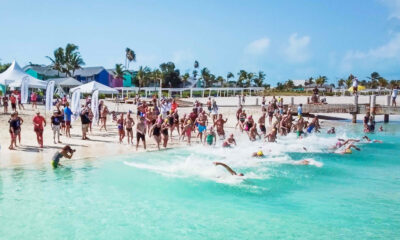

Getting Ready for the “Race for the Conch”
-
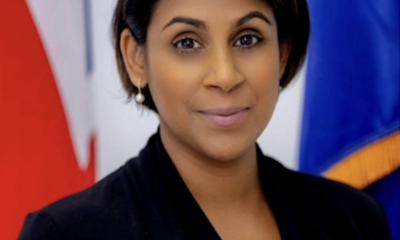

TURKS & CAICOS GOVERNOR’S RESPONSE TO ABC NEWS INTERVIEW
-
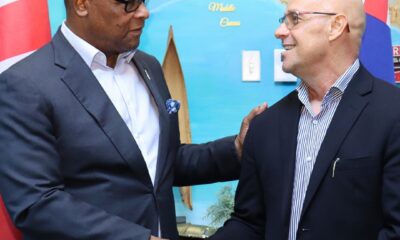

Serious Allegations get New Police Commissioner’s Attention
-


Ammunition Charges
-
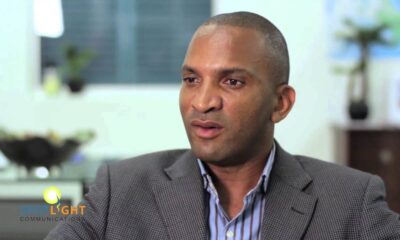

E. Jay Saunders “officially” fired by Premier Washington Misick
-
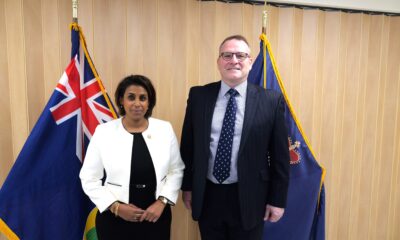

TCI gets New Interim Police Commissioner, what Chris Eyre brings to the table
Uncategorized
UN Sec-Gen has special Message on Nelson Mandela Day
Published
1 week agoon
July 18, 2024
Nelson Mandela showed us the extraordinary difference one person can make in building a better world.
And as the theme of this year’s Nelson Mandela International Day reminds us – combatting poverty and inequality is in our hands.
Our world is unequal and divided.
Hunger and poverty are rife.
The richest one per cent are responsible for the same quantity of planet-wrecking greenhouse gases as two-thirds of humanity.
These are not natural facts. They are the result of humanity’s choices. And we can decide to do things differently.
We can choose to eradicate poverty.
We can choose to end inequality.
We can choose to transform the international economic and financial system in the name of equity.
We can choose to fight racism, respect human rights, combat climate change, and create a world that works for all humanity.
Every one of us can contribute – through actions large and small.
I join the Nelson Mandela Foundation in urging everyone to perform 67 minutes of public service on Nelson Mandela International Day – one minute for each year he fought for justice.
Together, let’s honour Madiba’s legacy and turn our hands towards building a better world for all.
Uncategorized
AfriCaribbean Trade and Investment Forum (ACTIF2024) set to strengthen Africa-CARICOM linkages
Published
2 months agoon
May 28, 2024
Speakers at ACTIF will include global superstars Viola Davis, Serena Williams, Didier Drogba and African and CARICOM Heads of States
Nassau, Bridgetown, Georgetown, May 28, 2024 – Excitement mounts as The Bahamas prepares to host the Afreximbank Annual Meetings (AAM) and the AfriCaribbean Trade and Investment Forum (ACTIF) from 12 – 14 June 2024 in The Bahamas. Themed “Owning Our Destiny: Economic Prosperity on the Platform of Global Africa,” ACTIF2024 is set to forge significant pathways for economic prosperity between Africa and the Caribbean.
Other distinguished speakers will include Heads of State from seven CARICOM countries, former Prime Ministers, Ministers of Trade, Economic Development and Finance, Dr. Roger W Ferguson, Former Vice Chair of the Federal Reserve, USA, Prof. Andreas Klasen, Professor of International Business and Director of the Institute for Trade and Innovation at Offenburg, and many more.
Economic Development and Finance, Dr. Roger W Ferguson, Former Vice Chair of the Federal Reserve, USA, Prof. Andreas Klasen, Professor of International Business and Director of the Institute for Trade and Innovation at Offenburg, and many more.
Professor Benedict Oramah, President and Chairman of the Board of Directors, Afreximbank, said: “We are witnessing shifts in the global economic landscape and the trade strategies of major economies, making it imperative for African and Caribbean nations to unite for mutual prosperity. The Afreximbank Annual Meetings and AfriCaribbean Trade and Investment Forum in The Bahamas will serve as a strategic platform to enhance our economic bonds. These events indicate a vibrant assertion of our shared destiny. We are poised to harness the dynamic economic growth within our regions, enhancing our collective resilience and prosperity.”
The event promises to be a pivotal platform for high-level discussions on economic development and regional integration.
Building on the successes of the inaugural AfriCaribbean Trade and Investment Forum held in Barbados in 2022 and the gathering last year in Guyana, this year’s Forum in The Bahamas will further elevate and expand upon the discussions and initiatives previously set in motion. ACTIF2023, which focused on strengthening economic bonds and creating new investment opportunities, sets a precedent for meaningful collaboration between Africa and the CARICOM nations.
Afreximbank invites industry leaders, trade organisations and other stakeholders in the CARICOM region to participate and attend.
Registration is now open at https://2024.afreximbankevents.com.
Uncategorized
International Community must address conflict between Israel and Iran
Published
3 months agoon
May 12, 2024By
Shanieka
Garfield Ekon
Staff Writer
With tensions between Israel and Iran at an all-time high, a United Nations affiliated group is urging for calm and dialogue as their violent actions can cause tragic devastation on innocent civilians.
According to Heavenly Culture, World Peace, Restoration of Light (HWPL), an organisation that is dedicated to promoting peace through civilian-led initiatives, “it is a clear indication that the greatest victims of war are innocent civilians.
“How could those lost lives ever be brought back? What could compensate for the outcry of children and the anguish of the youth in devastated dwellings?,” the group noted in a media statement, adding that the international community should take “decisive measures” to address the conflict.
It is also advocating for the establishment of “comprehensive international laws” to safeguard peace for future generations. “HWPL remains steadfast in its commitment to fostering dialogue and reconciliation, offering hope for a peaceful resolution to the conflict between Israel and Iran,” the group said.
HWPL is a non-profit organisation, with a mission to promoting peace through education, and advocacy. It has a global network spanning over 170 countries. The organisation works to build bridges of understanding and cooperation, striving towards a world free from conflict and violence.
According to reports in various international media outlets, Iran and its militant partners on April 13 initiated a large-scale attack against Israel through launching several hundred ballistic missiles and drones. The international society expressed concerns over the possibility of war between the two states, since Tehran’s direct attack on Israel was unprecedented.
Experts have pointed out that the attack on Israel was Iran’s response to an airstrike on the Iranian embassy in Syria on April 1, which killed seven military advisers including three senior commanders.
TRENDING
-

 Caribbean News1 week ago
Caribbean News1 week agoCayman Relief Mission to Hurricane hit CARICOM nations
-

 Caribbean News7 days ago
Caribbean News7 days agoCARICOM raising profile and priority of its Migration Policy; curbing challenges ‘a tall order’
-

 Caribbean News1 week ago
Caribbean News1 week agoHurricane Help; Money donated to Jamaica, Barbados, St Vincent & the Grenadines, St Lucia and Grenada
-

 Caribbean News1 week ago
Caribbean News1 week agoJamaica’s Hurricane Recovery Efforts Bolstered by Donation from Cayman Islands
-

 Bahamas News7 days ago
Bahamas News7 days agoPrime Minister Davis: Cannabis Reform Compendium 2024 ‘a long time coming’
-

 News7 days ago
News7 days agoWhat the new UK Prime Minister had to say about the Rwanda Deportation Plan at his first press conference
-

 Bahamas News1 week ago
Bahamas News1 week agoBahamas Celebrates 51st Independence – ‘United In Love & Service’
-

 News7 days ago
News7 days agoTurks & Caicos’ E.J Saunders part of Election Observer team in UK on July 4




